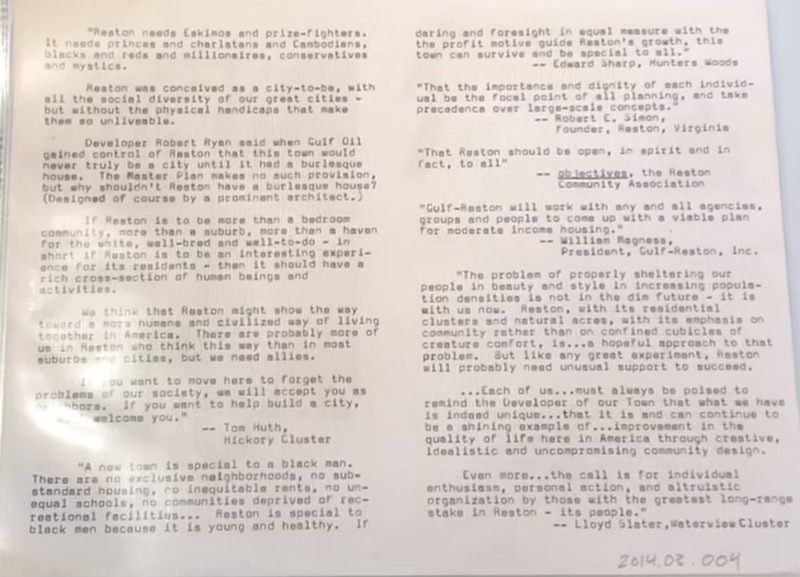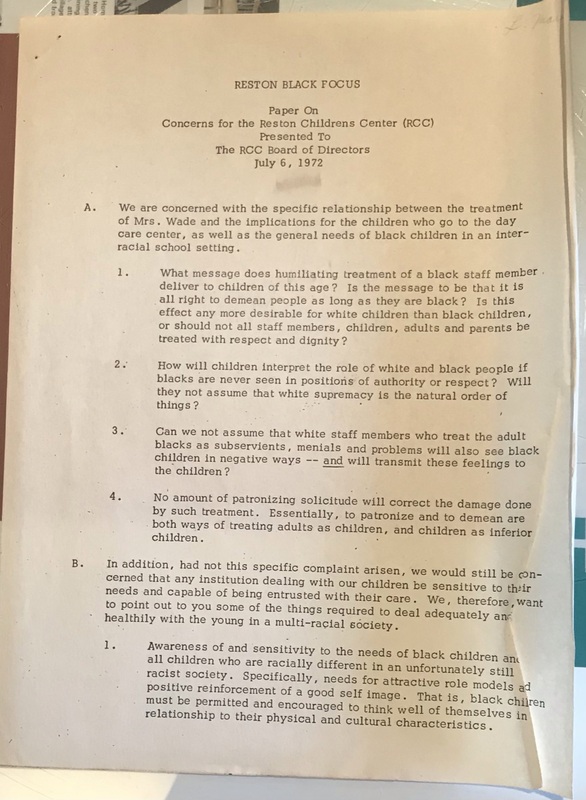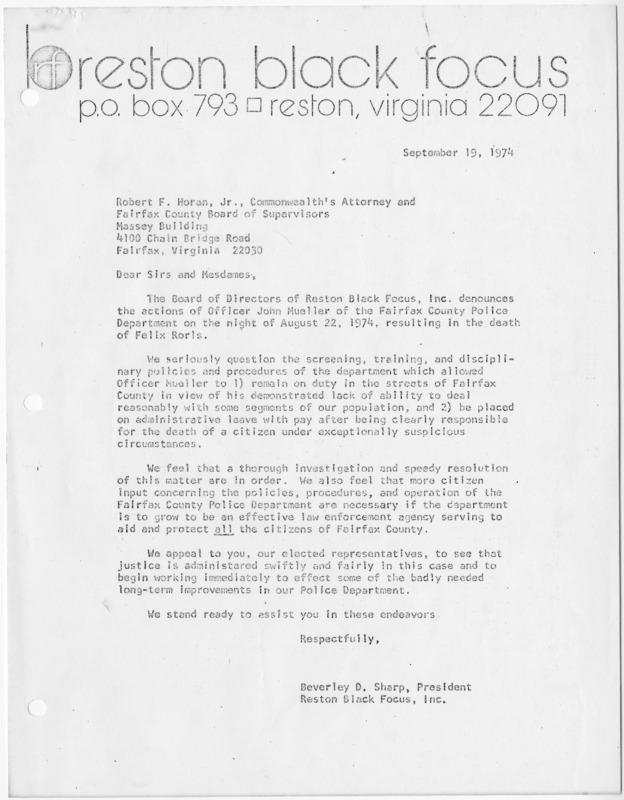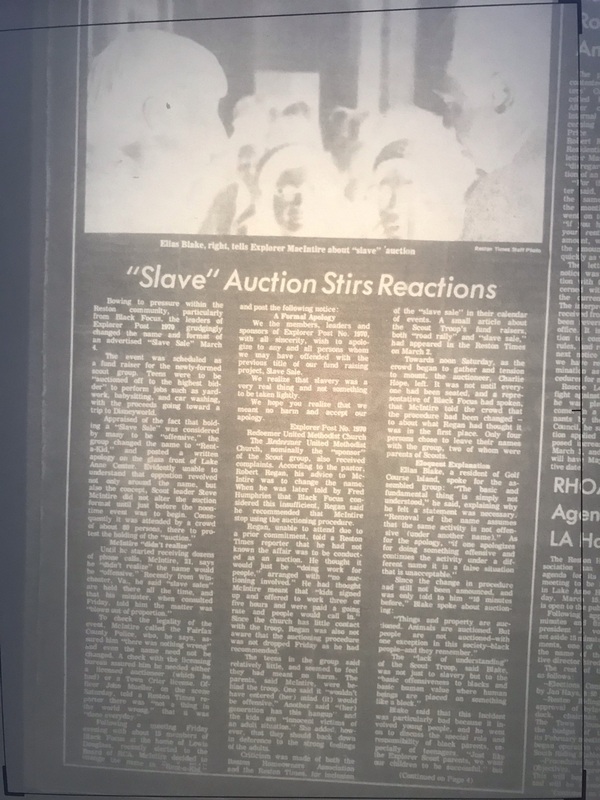Reston Black Focus
Founded in 1969, Reston Black Focus was a community-based organization that advanced the aim of integrating Black people into Northern Virginia suburban life. Reston, the residential area and town, promoted the idea of fostering an open community. A member of Reston Black Focus, Robert Secundy, explained its two key principles: “One principle was the fact that a group of diversified people could get along and work together. The other was that you could work in Reston and live in Reston.”[1]
The idea of an open community shaped the town of Reston itself. It was seen as a place that prized cooperation between community stakeholders, government officials, and private businesses in matters of local development and politics.[2] Reston Black Focus believed that Fairfax County and its "programs which spend millions of dollars" needed to make sure that the "black community is represented.”[3]
Reston Black Focus was also a family-oriented organization that addressed concerns relating to children and education. For example, in July 1972, Reston Black Focus sent a letter to the Reston Children’s Center Board of Directors regarding white children in that facility espousing racist views. The organization then proposed a program that could teach positive racial consciousness in the Reston Children’s Center. See the featured exhibit.[4]
Reston Black Focus also mobilized anti-racist forces in March 1972, when the Explorer Post No. 1970, a Boy Scout training troupe overseen by local policemen, advertised a forthcoming “Slave Sale.” The goal of the Explorer Post's event was to "sell" 23 young people, all members of the troupe, in a mock (antebellum) auction to raise funds for a trip to Disney World. Reston Black Focus called a meeting with Scout leader Steve McIntire to put pressure on him and the planners of the "Slave Sale" to alter the name of their occasion. McIntire expressed a public apology and changed the format of the event. The Fairfax County Police Department officer posted at some meetings between Explorer Post No. 1970 and Reston Black Focus was none other than John Mueller. He would later kill an unarmed Black man named Felix Rorls in Herndon. Mueller spoke to a local journalist about the auction controversy and proudly expressed his opinion, saying there was “not a thing in the world wrong” with the proposed "Slave Sale," which was “done everyday” for fun. Elias Blake, a member of Reston Black Focus, countered Mueller's thinking in a personal reflection on the deeper meaning of "property . . . [being] auctioned." Blake said "people are not auctioned- with one exception in this society- black people- and they remember.” He reminded town residents that he and they were "all together, . . . [and] to have this activity . . . even if blacks don’t speak up" was painful to Black families who wanted to "be respected” for their humanity and their neighborliness. Reston Black Focus took on even more difficult and dangerous initiatives when racialized violence affected Fairfax County. On the night of August 22, 1974, Clifton resident Felix Rorls, a 26-year-old Black man, was killed in Herndon by a White Fairfax County Police Officer named John Mueller. Rorls's murder triggered public demonstrations, including violent protests by Black Herndon residents. Reston Black Focus members rallied together to attend a community meeting with county officials, the Fairfax Community Action Program, and police representatives, all of whom spoke of keeping the peace. [5]
When Felix Rorls’s older brother Thomas U. Rorls filed a wrongful death suit in US District Court, the Board of Directors of Reston Black Focus contacted the Fairfax County Board of Supervisors and Commonwealth Attorney Robert Horan in September 1974 to denounce the police-involved killing and call for an investigation. [6] The Rorls family ultimately received civil damages, an outcome that Reston Black Focus supported.
By Sira Anissa I Thiam
[1] Robert Secundy, “Reston black focus the beginning,” YouTube video, 7:11, March 20, 2015, https://www.youtube.com/watch?v=1wSTqysBvFI
[2] Reston Black Focus records, Collection #C0137, Series 5, Box 3, Folder 57, Special Collections Research Center, George Mason University Libraries.
[3] Reston Black Focus records, Collection #C0137, Series 3 , Box 2, Folder 67, Page 3, Special Collections Research Center, George Mason University Libraries. https://hdl.handle.net/1920/9412
[4]Reston Black Focus promoted ideas that scholars like Shannon Sullivan have recently examined with regard to how young children develop racial concepts with and without adult input. Sullivan argues that teaching young children critical multiculturalism, which "confront[s] issues of power and white domination,” is a necessary goal of early education: Shannon Sullivan, Good White People: The Problem with Middle-Class White Anti-Racism (Albany, NY: State University Press of New York, 2014), 98.
[5]Boy Scout troupe "Slave Sale": The Reston Times, March 1972, Collection #C0137, Series 5, Box 3, Folder 57, Special Collections Research Center, George Mason University Libraries. Felix Rorls murder: Evening Star (Washington (DC), District of Columbia), August 27, 1974: 13,15. Readex: America's Historical Newspapers. https://infoweb.newsbank.com/apps/readex/doc?p=EANX&docref=image/v2%3A13D5DA85AE05A305%40EANX-14E3F2D807053625%402442287-14E225FF5B8BC46C%4012.
[6] Evening Star (Washington (DC), District of Columbia), August 21, 1975: 23. Readex: America's Historical Newspapers. https://infoweb.newsbank.com/apps/readex/doc?p=EANX&docref=image/v2%3A13D5DA85AE05A305%40EANX-14E5E88676BE04EA%402442646-14E3CE4CC817CFEA%4022-14E3CE4CC817CFEA%40.




